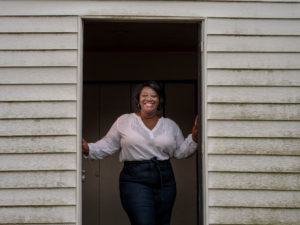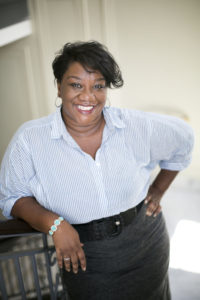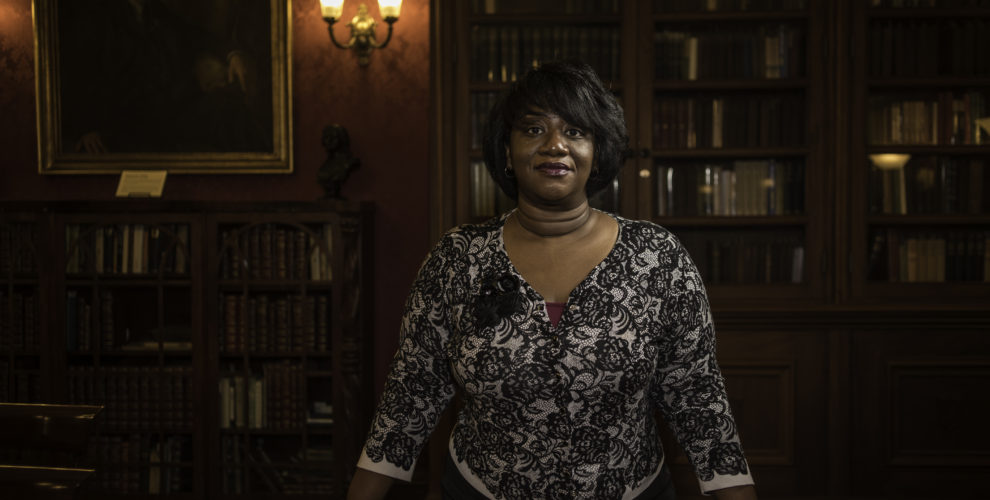Entre Nous: An Interview with Tressie McMillan-Cottom
by
Marcelle Karp

Well, it does in a way. Listen, I’ve got people on both sides saying that about the other side, right? So, I’ve got sociologists going Thick? And then I’ve got social scientists saying that and then I’ve got pop culture people saying the same thing, so that was actually part of the fun of it.
Your Twitter game is pretty ideal. I did a spit take at your tweet, “Feminism is working great.”
Well then, it was all worth it. That’s the unfortunate side effect, I think, of reading my tweets. Oh man, that was quite the visual last night. I mean it was just perfect in that way that you couldn’t have written it better them standing up and the laughing repartee with the President. It was just a perfect thing of how many of us who wished there were things we could make the political system do for us. Look at this how easy it was for them to erase their differences and give us that visual of them looking like they were all laughing on the same side of the joke; it was something.

In your book, you talk about Knowing Your Whites.
So I’ll tell you a funny story: the phrase comes from a guy I used to date, said it once and I died laughing. I told him it was this perfect encapsulation of what I had been raised with culturally—being Black in the south (which is a particular type of experience of race)— which is one of the things I wanted to call out with that, and having then grown up and experienced different racial hierarchies. I’ve lived across various parts of the country and understood that everywhere in the world there was a racial hierarchy but that it did look different depending on where you were. Not only looked different depending on where you were but like where you were standing when you got there. Being Black in Northern California, [there] was still the experience of anti-Blackness and racism was still a thing but it would manifest differently growing up in North Carolina, it would manifest differently in Mississippi or Chicago. When we’re talking about this big system of racism, we sometimes lose the nuance of how it can manifest differently but it doesn’t discredit the fact that it exists. One of the quickest ways to sort out where you’re standing in the racial hierarchy at any given time is to figure out what kind of white people you are dealing with. Our survival historically has depended on: you better Know Your Whites. Because if you don’t, it can be dangerous for you, it can be physically dangerous, it can be dangerous to your status or to your well being. To Know Your Whites is to know how is racism playing out in this context. What are the assumptions that these white people have about who I might be and how are those assumptions about to mess with my day right now. Understanding that is for many of us, this automatic process we’re able to do it quickly.
One of the reasons why it was funny when this guy said it to me is that what we were talking about some young Black people at the time and we were like, they are in trouble. They had got this sort of book learning about how racism worked and somehow had missed inheriting all of that knowledge you’re supposed to get from your community and your family. I think that the election of Donald Trump was exactly that, it was a reminder to the rest of us [of] do not forget that this is what whiteness does, progress is always going to come at our discretion, this reassertion of, this is a white nation a white culture and that means something particular for you even if you’re the President of the United States so Knowing Your Whites is extremely important to understand how the world works.
You refer to your mom, later in your book, as The Vivian.
Let me tell you, it says it all.

So you were born in Harlem, you come from North Carolina, and you live in Virginia. Is there a city you feel the most comfortable in?
Wow, that is a great question. When I was in graduate school getting my PHD, one of my personal goals was I wanted to find my place. I was looking for an epiphany (I’m very dramatic sometimes). So I did this thing where I applied to all kinds of programs across the country because I wanted to figure out where I belong. I’ve done New York, I had done Chicago so I felt like I’d done the Midwest and then I did Northern California, I did Southern California and I did Canada. I was just trying it out. I did all of that only to end up four hours away from where I grew up! So I tell people, oh I searched the world to find myself and it was just in the backyard. For whatever reason, I am the most legible (which is what I call it). I do think that even negative experiences of the world are better than being invisible so I feel the most sane in the South. I make sense in the South. Why did I develop all of those skills of understanding the South, of becoming so expert in its culture and its language and its history and then live somewhere where none of that applies to my daily life? I’m comfortable here, I am legible here and this place makes sense to me. I live in Richmond now and Richmond is a little different for the South; it’s the home of the confederacy. I feel the most at home in some place like a Richmond, like Atlanta, like North Carolina where I grew up because of that, because it just makes sense to me. When people go, “The South is so racist,” I’m like, everywhere is racist, it’s just which racism you want to deal with. If the place is in, you the place is in you, whether it’s hard or not, there’s something about it being familiar.
You say, in your book, “Black women and Black girls are a problem” and you also say, “I speak Black woman fluently.” What does it mean to a Black woman to be female right now?
I wrestle with the paradox in this book. To be a Black woman, Black and female, right, which is the paradox of: we are living in the most opportune time ever to be a Black woman in modern history. I look at the young Black girls who are coming up behind me in their early twenties and there’s a gang of them calling me “Auntie” and I’m trying not to let that kill my soul but it’s a term of respect and I totally get it, it’s very adorable and I also want to kill them. They’re amazing. I’m looking at them and I’m going holy shit, if we gave you all this, if you’re already here at twenty-two, twenty-four years old, I can not even imagine them in twenty years, right, it’s amazing to be a part of and to be in this moment. At the same time, it is still just so statistically bad to be a Black woman, right, it still means things for our life that we can not overcome individually. We can do all of the right things and there are just going to be all of these massive things we’re never going to overcome; we’re not going to overcome wage gaps and wealth inequality. We’re probably not going to overcome the reality of what it means to be closer to the criminal justice system than white people. We’re never going to overcome our health disparities. We can do all the right things and the best we can do I think is to be marginally better than the mean, which is not that great. I think being a Black woman right now is that at an individual level, it can be this amazing time for us. Almost all the Black women I know personally in my life right now are living amazing lives. I look around at us and we are self-actualizing. People are running businesses. We have all this language to live our best life and people are feeling comfortable in their skin. They don’t have to straighten their hair for work anymore. Our makeup comes in all colors; we’ve got Fenty, for G-d’s sake.
On the other [hand], we’ve got all of this other stuff. It’s trying to hold that paradox, which is why I say Black women are so good at understanding our contemporary moment in history because we live constantly in that paradox. We’re able to see it in other things. How can our economic condition be so vastly unequal? How can the stock market be doing so great yet we’re creating so many new poor people? Black people understand how those things can be happening at the same time. Black women have been trapped in that moment for at least thirty or forty years now. I think that’s why we’re so good at looking out onto the world. I think we’re living in a paradox and we’re really good at seeing them.
And it dovetails back into everything else you’ve written about. I have so many friends who are constantly wondering what they are doing with their careers, only to remember they can’t see themselves doing anything other than this one thing, or can’t see themselves anywhere but this one place.
At this point, I’ve got an academic career that is in the margins: I am on the high end of the distribution, I am extremely successful in many ways and that comes with a lot of professional envy which would be there no matter who I was. But because I am a black woman, I think the envy is especially kind of sharp and so because of that, I get lots of sharp rebukes about why haven’t I moved to another university, why I’m not doing this, why am I not taking a year at Oxford and these other things. It is exactly what your colleague was saying, which is what those people don’t understand is they can only understand me through their own understanding of what status looks like. They don’t know the value of being safe. I am fairly secure in my current work environment in a way that is unheard of for Black women. Black women don’t get the kind of freedom I currently have in my job right now. I would be crazy to trade that for the great unknown for a few extra dollars or for a few steps up the status ladder. And that looks crazy to people outside of it but that’s only because if you’ve got all of these options where you can feel safe then of course you don’t understand my decision-making. I feel that deeply, what she was saying. And trust me, my job is not Shangri-la, it’s crazy like everywhere else is crazy but I am safe and there’s no price for that when you’re a Black woman.
You don’t delve into feminism in THICK. I think I saw the words “Black feminism” maybe three times in your book.
That sounds about right. I do think some of my contemporaries do a much better job of this, of unpacking and dealing with the tensions of using the f-word. Britney Cooper does a wonderful job of owning it, she’s critical and pushing back on the expectations of it. I am feminist in this sort of basic materialist way: I am a Black feminist and I try to be that every day in my daily life. I try to vote as a Black feminist, I try to give my money away as a Black feminist. One of the reasons why I didn’t want to tackle it in this text in that way is exactly what you said: there are arguments I didn’t want to have. There are some arguments that frankly, I am tired of having. I don’t know that they serve my thinking very well or my writing very well to have them at this point. Which matters more, race or gender? I don’t even have the patience to pretend that’s a good question anymore. Like tons of Black feminists before me, that’s not even a question that in any way makes our lives more clear. It’s not a question that in any way brings any clarity of thought to what we’re saying. Our lives can not be extricated in that way so why even go down that road?
I am not interested in high powered feminism. I don’t care about feminism in the executive suite. None of that impacts anything I care about on a daily basis, I am interested in what Black feminism looks like. When you are living in Alabama and you are three hours away from any women’s health care and they have effectively shut down the social safety net for people in the country and racist segregated school systems are still the norm for you? I want to know how a feminism can speak to that. I do fundamentally believe that that’s the feminism that probably saves the majority of us. That’s the feminism that I think if we got that right is whats best for all of us, even the executives.

I agree. A healthy bar is economic equality, to be ambitious, to strive for being everything you want to be, which can include being in a C-suite but shouldn’t only be about that.
I think Sheryl Sandberg—and I’m just using her as a stand in here because its fun to punch on her—her being COO is an individual accomplishment. But Sheryl Sandberg the plural, the women who aspire to that, would be much better off with a Black feminism that makes something like that kind of billionaire wealth impossible for people. I just fundamentally believe that. The individual Sheryl Sandberg might not agree and say that her life would be worse off. But all of the women aspiring to be like Sheryl Sandberg would be much better off if it was impossible for them to become that.
While they’re not perfect, a lot of the democratic socialist feminists get as close to that as possible in our current political environment, of saying no feminism has to deal with that when they’re talking about things like minimum wage regulations, when they’re talking about pushing back against abuse of right to work practices, student loan. Feminism that’s only about how much money you can make and not about how we can redistribute the money to me is just mostly a distraction.
As we wrap up, I want to again, talk about your Twitter game. Your tweet about your ex destroyed me. I mean.
I know! I can be petty in just the smallest but most meaningful ways.
That pettiness reaches me in my core.
Oh good. We’re out here and we have to find each other. We need our tribe so I’m so glad. Oh yeah, it does my heart good that everytime he Googles you know, because you just know it happens. It does my heart so good.







0 Comments